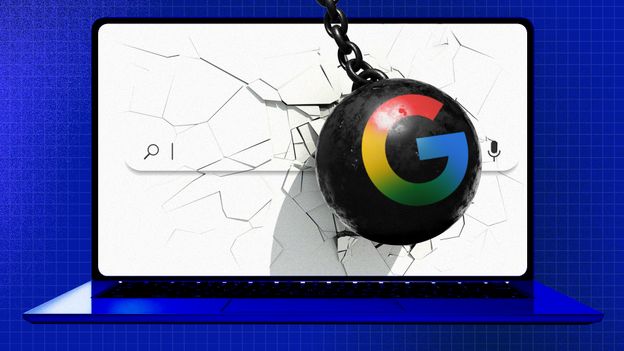- cross-posted to:
- technology@lemmy.world
- technology@beehaw.org
- cross-posted to:
- technology@lemmy.world
- technology@beehaw.org
Google says a new AI tool on its search engine will rejuvenate the internet. Others predict an apocalypse for websites. One thing is clear: the current chapter of online history is careening towards its end. Welcome to the “machine web”.
The web is built on a simple bargain – websites let search engines like Google slurp up their content, free of charge, and Google Search sends people to websites in exchange, where they buy things and look at adverts. That’s how most sites make money.
An estimated 68% of internet activity starts on search engines and about 90% of searches happen on Google. If the internet is a garden, Google is the Sun that lets the flowers grow.
This arrangement held strong for decades, but a seemingly minor change has some convinced that the system is crumbling. You’ll soon see a new AI tool on Google Search. You may find it very useful. But if critics’ predictions come true, it will also have seismic consequences for the internet. They paint a picture where quality information could grow scarcer online and large numbers of people might lose their jobs. Optimists say instead this could improve the web’s business model and expand opportunities to find great content. But, for better or worse, your digital experiences may never be the same again.
On 20 May 2025, Google’s chief executive Sundar Pichai walked on stage at the company’s annual developer conference. It’s been a year since the launch of AI Overviews, the AI-generated responses you’ve probably seen at the top of Google Search results. Now, Pichai said, Google is going further. “For those who want an end-to-end AI Search experience, we are introducing an all-new AI Mode,” he said. “It’s a total reimagining of Search.”
You might be sceptical after years of AI hype, but this, for once, is the real deal.



But the point is that significantly lower traffic will kill the business model of many websites, and thus kill many websites.
I remember it when good websites didn’t have any business model at all because there weren’t anyone busy with inventing it, all people involved spent their effort on making the website valuable.
The business models were in TV and radio outside of the web.
I’m not old, I’m 29.
I’m 52, I remember when websites were little more than ‘Oh I guess we have to have an internet presence, so here’s a website that’s nothing more than an ad for our TV show, book, movie, etc.’
Ydes but it will not “destroy the web”
What do you imagine ‘destroying the web’ looks like if not killing off huge swaths of websites that relied on traffic/ads to sustain themselves? Do you imagine a man has to bleed all the way out before we can say he’s going to die, or is it sufficient to look at the severity of the wound to critical systems in his body and determine that he is probably going to die?
Not to mention the fact that the remaining sites that can still hold on, but would just have to cut costs, will just start using language models like Google’s to generate content on their website, which will only worsen the quality of Google’s own answers over time, which will then generate even worse articles, etc etc.
It doesn’t just create a monetization death spiral, it also makes it harder and harder for answers to be sourced reliably, making Google’s own service worse while all the sites hanging on rely on their worse service to exist.
Or paywalling literally everything so there’s basically no easily-accessible content on the web anymore. But yeah I’ve been adding ‘reddit’ to most of my searches for years so I can get answers from actual people instead of full-page articles filled with AI-generated bullshit I don’t care about, so that’s a fair point.